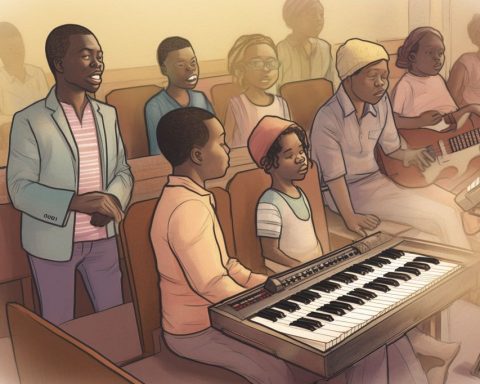The clash between faith and modern conflict is a tricky issue, especially when ancient stories are used to talk about today’s problems. Reuben Wagenheim, a synagogue leader, shared a cheerful email about community events but ended with a shocking reference to a Biblical enemy, Amalek, comparing them to Hamas. This stirred up strong reactions and led to an apology from Wagenheim, who realized his words could be seen as promoting violence. The incident sparks important questions about how we interpret religious texts in our world today, reminding us of the need for peace and understanding amidst conflict.
How does faith intersect with modern conflict?
The intersection of faith and modern conflict raises critical questions about the interpretation of ancient texts. Incidents like Reuben Wagenheim’s controversial email highlight the complexities of using religious narratives in contemporary discourse, emphasizing the need for responsible interpretation and a commitment to peace.
A Day in the Life of Marais Road Shul
The convergence of religious belief and modern geopolitical conflict often sparks intense debate, revealing the complexities of interpreting ancient texts in today’s world. A recent incident involving Reuben Wagenheim, President of the Marais Road Shul in Sea Point, vividly illustrates these challenges.
Wagenheim’s March email to congregants painted a vibrant picture of community life. He described events like children’s face-painting, visits from rabbis, weddings, and the melodious tunes of the synagogue choirs. “What a pleasure to hear these refreshing soprano voices singing beautiful Jewish tunes,” he wrote, encapsulating the essence of a thriving, close-knit congregation.
However, as he neared the end of his lengthy email, the tone shifted dramatically. Wagenheim referenced a Biblical passage from the Book of Samuel, invoking the story of Amalek, ancient enemies of the Israelites. He drew a parallel between the Biblical Amalekites and Hamas in Gaza, quoting, “G-d says ‘now go and strike down Amalek (read Hamas) and utterly destroy all that they have, have no pity on them but kill every man and woman, child and infant, ox and sheep, camel and ass.'”
The Controversy and Apology
Wagenheim’s reference to Amalek is not unprecedented. Israeli Prime Minister Benjamin Netanyahu has used the same narrative to justify actions against perceived enemies. In the Hebrew Bible, Amalek represents an archetypal adversary of the Israelites, a symbol of an existential threat that must be eradicated. The modern implications of such a comparison, however, are profoundly troubling and Wagenheim’s email caused significant distress among some congregants, leading to a swift and unequivocal apology.
“Upon reflection, I recognize that my words could be construed as a call to genocide. I deeply regret this and the offense and hurt it may have caused,” Wagenheim wrote. Emphasizing that he is a layman, not a biblical scholar, he expressed regret for his choice of words. “Anyone who knows me will confirm that I am not a man given to hatred, bitterness, or violence. I fully embrace our traditions and core principle of shalom/peace among all humankind.”
His apology acknowledged the potential for misinterpretation and the inherent danger in using religious texts to justify modern violence. It underscored his commitment to peace and his vision of a future where Israelis and Palestinians coexist peacefully. Despite his contrition, the reaction from some quarters remained severe.
Reaction from the Community
Jared Sacks and Megan Choritz of South African Jews for a Free Palestine responded with strong condemnation. They highlighted the ongoing humanitarian crisis in Gaza, describing it as an “open-air prison” where two million people endure bombings, executions, and starvation. “Wagenheim takes it upon himself to quote one of the most controversial passages in the Bible,” they said. “This passage calls for and seeks to justify the genocide of a people called the Amalekites. This is unacceptable hate speech.”
Their critique did not stop at Wagenheim’s initial email. They called for his removal from his position and a formal complaint to the South African Human Rights Commission. “Calling for a genocide is not Judaism. Our Judaism is one of Tikun Olam, healing the world, and where every human life is a world. Our Judaism is about peace, mercy, justice, and love,” they asserted.
Broader Implications and Ethical Challenges
This incident brings into sharp focus the tension between ancient religious texts and their interpretation in a modern, secular context. The story of Amalek has been part of Jewish liturgy for millennia, reminding the faithful of the dangers the Israelites faced. Yet, its application to contemporary conflicts raises profound ethical questions. Can ancient narratives be reconciled with modern values of human rights and international law? Are there limits to how religious texts should be used in political discourse?
Wagenheim’s reference to Amalek and the subsequent backlash also highlight a broader struggle within the Jewish community. There is a tension between traditional interpretations of scripture and the evolving understanding of justice and morality. This struggle is not unique to Judaism; many religious communities face similar challenges as they navigate the complexities of modernity.
Historically, religious texts have been both a source of comfort and a justification for conflict. The Crusades, the Inquisition, and various jihads throughout history illustrate how religious narratives can be employed to justify violence. Yet, these same traditions contain profound messages of peace and reconciliation. The key lies in interpretation and the willingness to adapt ancient wisdom to contemporary ethical standards.
Moving Forward
In the case of Wagenheim, his initial email and subsequent apology reflect a personal journey of reflection and growth. His willingness to acknowledge the potential harm of his words and his commitment to peace offer a path forward. This incident serves as a reminder of the power of words and the responsibility that comes with leadership, especially in a religious context.
The broader implications for the Jewish community and beyond are significant. This episode invites a deeper exploration of how religious narratives are used in contemporary political discourse. It challenges communities to reflect on their values and the ways in which they engage with their sacred texts. As the world grapples with complex conflicts and the quest for peace, the lessons from this incident are both timely and universal.
FAQ: The Intersection of Faith and Modern Conflict
What sparked the controversy involving Reuben Wagenheim’s email?
Wagenheim’s email, which initially celebrated community life at the Marais Road Shul, took a controversial turn when he referenced the Biblical enemy Amalek and compared them to Hamas. This comparison led to significant backlash, prompting an apology from Wagenheim for potentially promoting violence.
How did Wagenheim respond to the backlash from his email?
Following the controversy, Wagenheim issued an apology acknowledging that his words could be interpreted as inciting violence or genocide. He expressed regret for his choice of words, reaffirming his commitment to peace and understanding among all people.
What are the broader implications of using ancient religious texts in modern conflict?
The incident highlights the complexities and ethical challenges of interpreting ancient texts in contemporary contexts. It raises questions about how such narratives can be reconciled with modern values of human rights and the responsibilities of leaders when addressing sensitive issues.
How did the community react to Wagenheim’s comments?
The reaction from members of the community was largely critical, with some demanding Wagenheim’s removal from his position and filing a complaint with the South African Human Rights Commission. Critics emphasized that invoking calls for genocide is incompatible with the values of Judaism, which emphasize peace and healing.
What lessons can be drawn from this incident for religious leaders and communities?
This situation underscores the importance of responsible interpretation of religious texts and the potential consequences of their misapplication. It serves as a reminder of the need for sensitivity and commitment to peace in leadership roles, particularly in religious contexts.
How can religious communities navigate the challenges of modernity while honoring their traditions?
Communities are encouraged to engage in reflective dialogue about their values and the interpretation of sacred texts. By emphasizing messages of peace, justice, and mercy, religious groups can adapt ancient wisdom to address contemporary ethical standards and promote coexistence in a diverse world.












